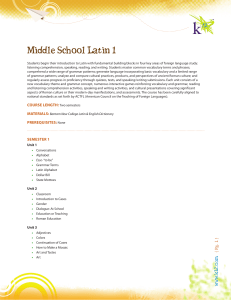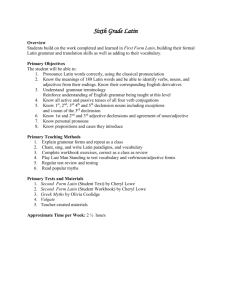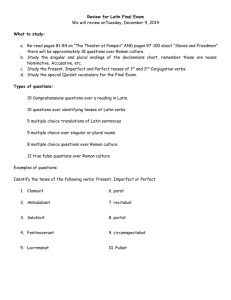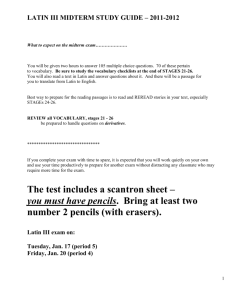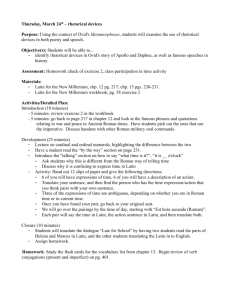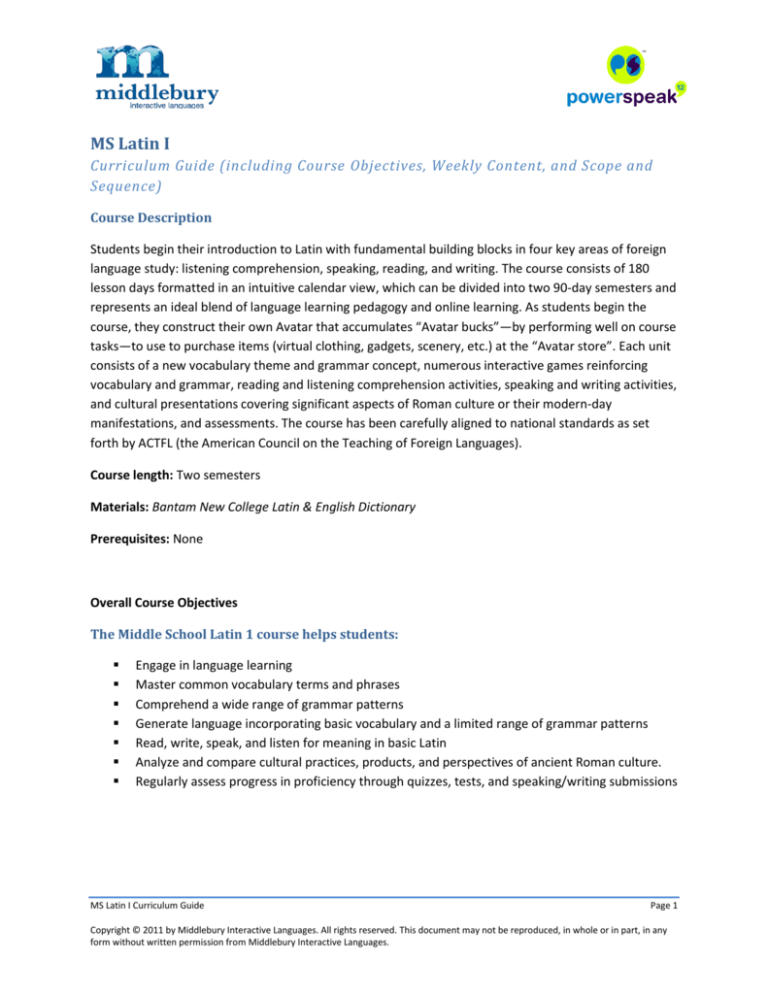
MS Latin I
Curriculum Guide (including Course Objectives, Weekly Content, and Scope and
Sequence)
Course Description
Students begin their introduction to Latin with fundamental building blocks in four key areas of foreign
language study: listening comprehension, speaking, reading, and writing. The course consists of 180
lesson days formatted in an intuitive calendar view, which can be divided into two 90-day semesters and
represents an ideal blend of language learning pedagogy and online learning. As students begin the
course, they construct their own Avatar that accumulates “Avatar bucks”—by performing well on course
tasks—to use to purchase items (virtual clothing, gadgets, scenery, etc.) at the “Avatar store”. Each unit
consists of a new vocabulary theme and grammar concept, numerous interactive games reinforcing
vocabulary and grammar, reading and listening comprehension activities, speaking and writing activities,
and cultural presentations covering significant aspects of Roman culture or their modern-day
manifestations, and assessments. The course has been carefully aligned to national standards as set
forth by ACTFL (the American Council on the Teaching of Foreign Languages).
Course length: Two semesters
Materials: Bantam New College Latin & English Dictionary
Prerequisites: None
Overall Course Objectives
The Middle School Latin 1 course helps students:
Engage in language learning
Master common vocabulary terms and phrases
Comprehend a wide range of grammar patterns
Generate language incorporating basic vocabulary and a limited range of grammar patterns
Read, write, speak, and listen for meaning in basic Latin
Analyze and compare cultural practices, products, and perspectives of ancient Roman culture.
Regularly assess progress in proficiency through quizzes, tests, and speaking/writing submissions
MS Latin I Curriculum Guide
Page 1
Copyright © 2011 by Middlebury Interactive Languages. All rights reserved. This document may not be reproduced, in whole or in part, in any
form without written permission from Middlebury Interactive Languages.
Recurring Content
Vocabulary Theme
o Each unit presents a new set of vocabulary words through various self-correcting
activities. A printable vocabulary list, which includes pronunciation, is also provided.
Grammar Concept
o Each unit introduces a new grammatical pattern. The concept is reviewed through a
range of interactive games, and the patternis presented in a printable explanation of the
pattern.
Reinforcement Activities
o A range of interactive games (incrementally increasing in challenge) helps students
reinforce vocabulary and grammar concepts. These activities may be completed
multiple times so that students can better retain and apply the new information.
Students accumulate “Avatar bucks” by performing well on these and other interactive
challenges.
“Stretch” Activities
o Each unit students work through an inventive and challenging activity to comprehend
involved passages in Latin, or to generate their own sentences in Latin. Stretch activities
include series of Latin phrases, simple songs or dialogues in Latin, simple sentences that
students string together from basic building blocks, and more. These activities help
students work creatively in Latin to communicate and make meaning.
Presentation of Culture
o Each unit students learn about various cultural aspects (e.g. practices, products, and
perspectives) of the ancient Roman world, or its modern-day manifestations. Topics
include: Roman theater, The Aeneid, Julius Caesar, Gladiators, etc.
“Gameshow” Review
o Each unit students review material from the unit’s content in a “Gameshow” that builds
on the motivations and friendly competition of familiar television game shows. Students
are pitted against a virtual opponent and earn “Avatar bucks” as they demonstrate their
mastery of the unit’s material. The burden of review for the unit assessment is thus
transformed to a fun and engaging game.
Oral and Written Activities
o Each unit, students complete oral and written activities based on the vocabulary,
grammar pattern, or “Stretch” activity presented that unit. These activities give students
a chance to become more familiar with the speaking and writing patterns of Latin by
applying them in communicative situations.
Assessments
o Culture comprehension quizzes verify that students have captured facts and
understandings from the cultural presentations.
o End-of-unit quizzes assess students’ mastery of the vocabulary words and grammar
concept presented that unit, and include an oral or written assessment.
MS Latin I Curriculum Guide
Page 2
Course Scope and Sequence
Semester 1
Vocabulary Topic
Grammar Pattern
Other/Stretch
Latin Phrases/LOL Culture
Unit 1
Conversations
alphabet
Esse- “to be”
Grammar terms
Latin alphabet
Dollar bill
Unit 2
Classroom
Introduction to cases
Gender
Dialogue: At School education or
teaching
Unit 3
Adjectives
Colors
Continuation of Cases How to make a
mosaic
Art and tastes
Art
Unit 4
Common nouns 1
First Declension
(small list)
1st declension
Legal phrases
Legal Latin
Unit 5
Common verbs 1
# 0-20
1st conjugation present Song: Decem Digiti Religion
tense
Verb placement
Explain what an
Infinitive is
-ne (questions)
Gods &
goddesses
Unit 6
Food nouns, in 2nd
declension
2nd declension
Vocative case
Roman numerals 1- Food and eating
20
or drinking
How to make
Roman Sweet
Bread
Roman meals
Unit 7
Common verbs 2
#21-50
2nd conjugation
present tense
How to look up
verbs in a
dictionary
Romulus and
Remus
Unit 8
Family nouns in 3rd
declension
3rd declension
Roman numerals
Family or love
21-50
Comparison of
family members in
other Romance
languages
MS Latin I Curriculum Guide
Review of cases
How to do a
declension
Beginnings
State
Mottoes
Roman
Education
Mater- and
paterfamilias
Page 3
Semester 2
Vocabulary Topic
Grammar Pattern
Other/Stretch
Unit1
Common verbs 3
#50-100
3rd conjugation
How to look up
nouns in a
dictionary
Choose a Latin
name
Unit 2
Prepositional
phrases
Prepositional phrases
Roman numerals
50-100
Quotes from
Julius Caesar
Julius Caesar
Unit 3
Days, months,
seasons
#100-2000
Review all cases of
nouns
How to make a
water clock
Change to
phrases on age
Roman
Calendar
Unit 4
Circus Maximus and Imperfect tense
Colloseum
Roman numerals
100-2000
Group 1 – Change Gladiators
to phrases on
courage and
bravery
Unit 5
Animalia (Animals)
Noun/Adjective pairs
Dialogue: Pets
Song: Senex
Horatio
Phrases on
animals
Unit 6
Ubi est...?(Where
is...?)
Future tense
Dialogue: Gladiator Phrases on places Cicero
Games
Unit 7
Irregular verbs
Irregular verbs:
possum, eo, volo and
nolo
Imperatives
Important Dates in Phrases on
Carthage
Roman history
Carthage/Hanniba
l
Unit 8
Irregular adverbs
Adverbs
Negation
Math problems in
Roman numeral
MS Latin I Curriculum Guide
Latin Phrases/LOL Culture
Roman
Naming
Conventions
phrases on war
Farming in
Ancient
Rome
Hannibal
Page 4


